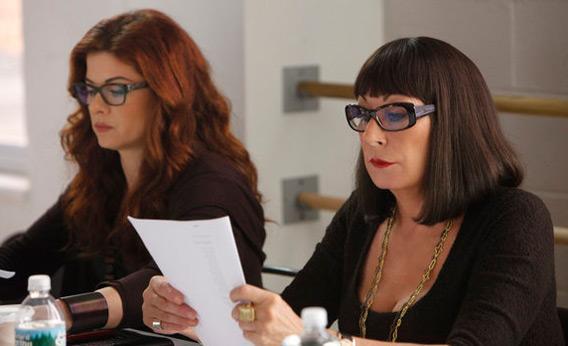It doesn’t really matter that Smash gets details about New York theater wrong. No one expects the NBC series to perfectly capture La Mama Experimental Theater Club or even to understand that Broadway columnist Michael Riedel would never write about the audition tape of a nonfamous actor who hasn’t even been cast. Smash makes no bones about being a soapy love letter to Broadway. But in selling its viewers a romantic fantasy about the business of theater, the show is missing out on the kind of drama that could make it a hit.
Everyone in the theater knows that Broadway producers typically lead long development processes (Trey Parker and Matt Stone started working on The Book of Mormon in 2004), lean heavily on star casting (Ricky Martin in Evita; Chris Rock in The Motherf—er With the Hat), and prefer name-brand adaptations (Ghost: The Musical?) over new productions. In Smash, by contrast, producer Eileen Rand (Anjelica Huston) aims to stage a new Broadway bio-musical put together quickly and with no marketable actors. When someone suggests casting Scarlett Johansson as the lead, these words actually come out of a Broadway producer’s mouth: “Get it out of your head. We are not chasing stars.” Maybe Smash is Broadway’s West Wing: Just as liberals pined for President Bartlet, serious theatergoers dream of this kind of Broadway producer. The real-life people who bankroll productions understand that Daniel Radcliffe sells tickets.
But Huston’s Rand is a romantic. One of the few insults from her soon-to-be-ex-husband that doesn’t make her throw a drink in his face comes when he accuses her of believing that Broadway theater is—gasp!—art. In this week’s episode, Rand, who is financially strapped, turns down her husband’s offer to secure money from a potential investor, played by real-life producer Manny Azenberg. Rand could use the money to fund her musical, but producing the show herself, on her on terms, matters more to her.
Such principled stands have set Smash up to being one of the least cynical portraits of theater producing on record. Think of Max Bialystock courting little old ladies to raise funds in The Producers. Or Max Fabian from All About Eve, who says of his star, “She loves me like a father. Also, she’s loaded.”
Rand, by contrast, has thus far been a cookie full of sugar. Her composer’s personal assistant is more diabolical than she is. In fact, Rand is as much of an endearing underdog as the fresh-faced actresses vying for the lead in her show, Marilyn, and Smash’s structure connects them explicitly. The scene of the 10-year theater veteran winning the role of Monroe is juxtaposed with the hot-shot director telling Rand he turned down an offer from her husband (and rival producer) in order to direct for her. Episode 2 ends in a producer’s tears of joy.
Don’t get me wrong: If you prick Broadway producers, they bleed. And you could argue that romantic notions about the theater do motivate producers as often as money does these days, since Broadway is hardly the wisest investment. Only around a quarter of the shows produced recoup their investment.
But the real world of Broadway producing is also packed full of intrigue and strategy. The battles over Times Square real estate alone offer daily melodrama. (Producers sometimes need their own shows to fail in order to place their new ones—eat your heart out, Max Bialystock.) It’s an odd dramatic choice for Smash to ignore the harder-hitting approach to the business side of the Great White Way.
The benefits of relishing the theater’s dirtier side are evident in the wonderful series Slings and Arrows, which sharply satirized the corporatization of the theater with a pitch-perfect ear, even while centering on a far less commercial sphere. Here, the theater producer is so desperate for a younger demographic that he creates an outside-the-box advertisement campaign suggesting his older subscribers are on the verge of death. Only on television could a Canadian Shakespeare festival come off as more bottom-line oriented than a Broadway musical.
Smash saves its unsentimental edge for sex, not money. Rand makes a comment early on that suggests that both she and her husband were unfaithful. The songwriter played charmingly by Debra Messing has also cheated on her husband. Yet both Huston’s and Messing’s characters are appealing: The sexist Hollywood notion that a female hero can’t have an affair without losing the audience’s sympathy is admirably and persuasively rejected here.
That’s refreshing, but it doesn’t make up for the missed opportunity of showing us the real hardball politics and power plays of Broadway. Imagine how riveting Smash would be if it gave us a character based on the man who is probably the most successful producer working today. Just in the past four months, Scott Rudin, whose latest triumph is the Tony-winning blockbuster The Book of Mormon, picked a public fight with a New Yorker film critic and a Pulitzer Prize-winning playwright. Rudin is also famous for throwing phones at assistants. If only a quarter of the off-the-record dish about Rudin is true, he’s a Machiavellian chess player whose handling of talent, promotion, scripts, and the press would provide enough fodder for countless plot twists. Add in the fact that his work is of a consistently high quality, and you have what could be an outsized character of Tony Soprano-level complexity, albeit one more feared.
I am hoping that Smash adds a Rudin character midseason and he steals Rand’s star actress to mount a competing musical. That’d force Rand to choose between cheerleading her show and engaging in some unpleasant political maneuvering. It would toughen the show up. But with ratings continuing to drop, it better happen fast. That’s showbiz.
